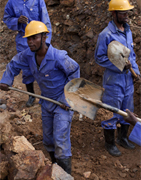
Editor’s Note: This blog was written by Enough Project Advocacy intern Amanda Schmitt.
The Enough Project recently released a resource page on the impact of Section 1502 of the Dodd-Frank Wall Street Reform and Consumer Protection Act, concerning the use of conflict minerals by companies publicly traded in the United States. Conflict minerals, specifically gold and the 3Ts (tin, tantalum, and tungsten), have fueled and continue to help sustain armed violence in the Democratic Republic of the Congo. Dodd-Frank 1502 mandates that U.S.-traded companies whose products contain conflict minerals must publicly report whether their minerals are coming from Congo and the surrounding region, and what measures they are taking to decipher if their minerals are linked to armed groups. The act utilizes public disclosure as a lever to support transparency, security, and the rule of law in supply chains and the mining sectors in the Great Lakes region of Africa. The positive effects have been twofold: the demand for conflict-free minerals has increased safety standards for miners working in conflict-free mines, and has redirected the flow of funding away from armed groups in Congo. The resource page details this with the significant change in the presence of armed groups at mines over the past five years:
“…the U.N. Group of Experts stated as recently as 2010 that “in the Kivu provinces, almost every mining deposit [was] controlled by a military group.” As of May 2014, nearly three-quarters (74 percent) of 3T miners were working in mines where no armed group involvement has been reported.”
Many Congolese communities and individuals have helped lead minerals reform efforts from the beginning, and currently support Dodd-Frank 1502. Justine Masika Bihamba, Coordinator of the organization Synergy of Women for Victims of Sexual Violence, explains:
“10 years ago, we were under de facto control of armed groups…today, let's admit we are a long way from that. And if we’re honest, that’s in part because of Dodd-Frank – it came to shine the light on those illicit actors. Today, despite the problems with governance, you can feel more government control.”
As the deadliest conflict since World War II with over 5.4 million fatalities from 1998 to 2007 alone, significant domestic and international actions in diverse areas are still critically needed to promote peace and human rights in Congo. The Enough Project supports the goals of Dodd-Frank 1502 as one of many necessary steps to create a tangible and positive impact on the social and economic context in the Congo. Dodd-Frank 1502 has improved transparency, security, and rule of law in the mining sector, as now over 60 percent of smelters have passed conflict-free audits.

